After working in the travel business in the UK and Europe, London-born Andrew Lewis came to Thailand in 1979 and eventually got a job in the same industry in Bangkok.
In 2001 he and his Thai wife bought land in Udon Thani province and Andrew decided on a complete change of lifestyle – growing vegetables, farming fish and finally raising pigs. It was hard work, but Andrew enjoyed his new and successful life as an upcountry farmer. Then his circumstances changed and suddenly he was back in Bangkok.
Andrew tells Maxmilian Wechsler about his unusual life journey in the country he's called home for 30 years.
ANDREW was born in South London and completed his schooling there. Fresh out of college he got a job with a British travel company. Later he worked in Holland and then for a couple of years in Denmark. “I came to Thailand for the first time in 1979 on holiday and returned three times. I have lived here permanently since 1988.
“I was in the process of getting a divorce from my first wife and I was between jobs, so I decided to spend some time travelling around Southeast Asia. Initially I planned to head back towards England through India, but I met a lady here. I did some more travelling in Southeast Asia and came back to Thailand.
I decided I wanted to settle down in Thailand, temporarily. I never had any plan to spend the rest of my life here. This was never ever my intention. I just thought I would spend a little time here and see how it went, and when I felt it was time to go, I would go. That time never came.
“I had been without work for about a year and a half and I needed to think seriously about making some money. Luckily, I had a Thai friend here who ran a travel agency in Bangkok; I met him when I was working in Europe. I asked him if he could find work for me and he told me: ‘I have one or two things you can help me with for a few months’. This was at the end of 1989. He gave me a temporary job which was supposed to last no more than six months. Ten years on, I was still working for him.
“By that time I was the commercial manager at the tour company, which means I was doing a bit of anything and everything. Sadly, my friend who gave me the Andrew Lewis job passed away a few years ago.
“I got married in 1991 and I kept working out of Bangkok for the same company until 2000, when I turned 50 and decided to ‘retire.’ ”
In 2001 he and his Thai wife bought land in Udon Thani province and Andrew decided on a complete change of lifestyle – growing vegetables, farming fish and finally raising pigs. It was hard work, but Andrew enjoyed his new and successful life as an upcountry farmer. Then his circumstances changed and suddenly he was back in Bangkok.
Andrew tells Maxmilian Wechsler about his unusual life journey in the country he's called home for 30 years.
ANDREW was born in South London and completed his schooling there. Fresh out of college he got a job with a British travel company. Later he worked in Holland and then for a couple of years in Denmark. “I came to Thailand for the first time in 1979 on holiday and returned three times. I have lived here permanently since 1988.
“I was in the process of getting a divorce from my first wife and I was between jobs, so I decided to spend some time travelling around Southeast Asia. Initially I planned to head back towards England through India, but I met a lady here. I did some more travelling in Southeast Asia and came back to Thailand.
I decided I wanted to settle down in Thailand, temporarily. I never had any plan to spend the rest of my life here. This was never ever my intention. I just thought I would spend a little time here and see how it went, and when I felt it was time to go, I would go. That time never came.
“I had been without work for about a year and a half and I needed to think seriously about making some money. Luckily, I had a Thai friend here who ran a travel agency in Bangkok; I met him when I was working in Europe. I asked him if he could find work for me and he told me: ‘I have one or two things you can help me with for a few months’. This was at the end of 1989. He gave me a temporary job which was supposed to last no more than six months. Ten years on, I was still working for him.
“By that time I was the commercial manager at the tour company, which means I was doing a bit of anything and everything. Sadly, my friend who gave me the Andrew Lewis job passed away a few years ago.
“I got married in 1991 and I kept working out of Bangkok for the same company until 2000, when I turned 50 and decided to ‘retire.’ ”
| Moving to the country “My wife and I bought a piece of land and built a house in Udon Thani province, where my wife was from. The place we bought is about 35 kilometers out of Udon Thani city. I took up farming, growing vegetables, and I had a large fish pond. The land wasn’t suitable for rice cultivation. It was interesting and I enjoyed it. “We had just over three rai where the house was and we bought another 10 rai (one rai equals 1,600 square metres) in the hills behind the village. I worked the land with my wife and some our Thai neighbors. They would help us on our land and we would help out on their land,” explained Andrew, whose brother bought a plot of land – in the name of Andrew’s wife adjacent to his and also raised fish in a large pond. “My brother had 7.5 rai. He didn’t live there and only came for holidays, so we pretty much managed that land as well. All in all we had about 20 rai we could use for different things. “Moving up-country from Bangkok wasn’t a problem for me. I am quite adaptable. It was very hard work but I enjoyed my surroundings. It was new and interesting living in a small village. After living in Bangkok for many years village life was a good change, and it was never boring.” |
Taking a chance on pigs
“At first we grew cassava every year, along with a variety of vegetables. Some years were very good and some very bad, depending on the market. When I hit my mid-fifties I started thinking about switching to something that would bring a better and more dependable income, and also be less work. I thought about keeping pigs or cattle. I didn’t know anyone who could give me any advice about raising cattle, but I happened to know a very good veterinary doctor in Udon Thani city who grew up on a pig farm. She was looking after my five dogs.
“She is a very nice lady and she was a tremendous help to me getting started. She gave me lots of valuable advice on feeding and housing the pigs. She told me how to make sure the pigs are fed nutritiously without it being too expensive, how to house them hygienically to avoid diseases, what they need in terms of medical care, and much more.
“We had neighbors in our village who keep pigs on a small scale, and they also gave practical tips on how to start up. I wouldn’t have known where to start on my own, but with all the good advice I was getting it seemed like it was worth a shot. We started with two female pigs for breeding. With help from my friends, I built a small enclosure just big enough for the two breeding sows and their piglets. I built it close to the house so it would be easier to look after them.
“The first sow to give birth died in labour, which was very disheartening. My friends told me not to be too discouraged. He said: ‘This happens maybe one in a hundred times. You are just unlucky it happened the first time.’ Fortunately, he was correct and it never happened again.
“We never tried to go large scale. I never had more than seven breeding females and up to 50-60 porkers at any one-time getting fat to sell to the market. The numbers depended on the size of the litters. Sometimes we had half a dozen fattening up, sometimes 60. We let them get up to around 100 kilograms and then sold them. I sold them alive I didn’t kill them myself. At the end we sold our pigs to only one buyer in Udon Thani. I raised pigs for about four years.
“The biggest expense with pigs is feeding them. My friend taught me how to do this economically.
About 85% of the feed was rice bran and broken grains of rice too small for human consumption. Only 15% was actually manufactured pig feed, which I bought from a company. This provided the pigs with vitamins and minerals they weren’t getting from the rice. Some people are lazy and just buy the feed already mixed. This is expensive and not necessarily the healthiest way. So I mixed it myself.
“Breeding sows cost maybe 3,000-5,000 baht each depending on their age. Obviously, the closer they are to breeding age, the more expensive they are. You don’t want to spend six or nine months feeding a sow before she’s ready to give birth. As time went on, of course, the pig enclosures got bigger and bigger.
“I fed the pigs and cleaned everything twice a day. It was good exercise. I sold my pigs to the man who owned the slaughter house, and he always gave me top price because he knew my pigs were good. Not too much fat, and the meat tasty because of the natural rice diet, plus some fresh vegetables sometimes. Everything they ate was natural, whic produces a nice, lean and very tasty meat.
“Whatever the range of prices was at the time I sold my pigs, I always got the top price, primarily because of the feed. I looked after them well and they were healthy. It means more work, of course. I was driving to the mill every week to buy hundreds of kilos of the rice. Then I had to take it back home, mix it up and so on, but it paid off.”
“At first we grew cassava every year, along with a variety of vegetables. Some years were very good and some very bad, depending on the market. When I hit my mid-fifties I started thinking about switching to something that would bring a better and more dependable income, and also be less work. I thought about keeping pigs or cattle. I didn’t know anyone who could give me any advice about raising cattle, but I happened to know a very good veterinary doctor in Udon Thani city who grew up on a pig farm. She was looking after my five dogs.
“She is a very nice lady and she was a tremendous help to me getting started. She gave me lots of valuable advice on feeding and housing the pigs. She told me how to make sure the pigs are fed nutritiously without it being too expensive, how to house them hygienically to avoid diseases, what they need in terms of medical care, and much more.
“We had neighbors in our village who keep pigs on a small scale, and they also gave practical tips on how to start up. I wouldn’t have known where to start on my own, but with all the good advice I was getting it seemed like it was worth a shot. We started with two female pigs for breeding. With help from my friends, I built a small enclosure just big enough for the two breeding sows and their piglets. I built it close to the house so it would be easier to look after them.
“The first sow to give birth died in labour, which was very disheartening. My friends told me not to be too discouraged. He said: ‘This happens maybe one in a hundred times. You are just unlucky it happened the first time.’ Fortunately, he was correct and it never happened again.
“We never tried to go large scale. I never had more than seven breeding females and up to 50-60 porkers at any one-time getting fat to sell to the market. The numbers depended on the size of the litters. Sometimes we had half a dozen fattening up, sometimes 60. We let them get up to around 100 kilograms and then sold them. I sold them alive I didn’t kill them myself. At the end we sold our pigs to only one buyer in Udon Thani. I raised pigs for about four years.
“The biggest expense with pigs is feeding them. My friend taught me how to do this economically.
About 85% of the feed was rice bran and broken grains of rice too small for human consumption. Only 15% was actually manufactured pig feed, which I bought from a company. This provided the pigs with vitamins and minerals they weren’t getting from the rice. Some people are lazy and just buy the feed already mixed. This is expensive and not necessarily the healthiest way. So I mixed it myself.
“Breeding sows cost maybe 3,000-5,000 baht each depending on their age. Obviously, the closer they are to breeding age, the more expensive they are. You don’t want to spend six or nine months feeding a sow before she’s ready to give birth. As time went on, of course, the pig enclosures got bigger and bigger.
“I fed the pigs and cleaned everything twice a day. It was good exercise. I sold my pigs to the man who owned the slaughter house, and he always gave me top price because he knew my pigs were good. Not too much fat, and the meat tasty because of the natural rice diet, plus some fresh vegetables sometimes. Everything they ate was natural, whic produces a nice, lean and very tasty meat.
“Whatever the range of prices was at the time I sold my pigs, I always got the top price, primarily because of the feed. I looked after them well and they were healthy. It means more work, of course. I was driving to the mill every week to buy hundreds of kilos of the rice. Then I had to take it back home, mix it up and so on, but it paid off.”
| Good times, bad times Andrew found that raising pigs can be quite profitable, but it is never without risk. “All farming and agriculture is unpredictable. You have to be sensible as in any other business. You have to use common sense. When you make a lot of money you don’t spend it all. You keep some back for a rainy day, and it’s sure to come. A lot depends on the scale,” said Andrew, adding that the bigger operators are insulated somewhat in hard times. “I got to know a man who had a pig farm just outside of Udon Thani city with 300 breeding females. It was a huge farm spread over a large area, so large that he had to give his staff motorcycles so they could get around. He made a lot of money, but not every year. “Once I was talking to him and he said: ‘I am losing one million baht a month at the moment, but I am not losing any sleep over it. I have got money in the bank. Two years ago I was making so much money I didn’t know what to do with it. So I put it in the bank because I knew things would turn around. My father and I have been raising pigs for more than 35 years, and we know how it is. There are good years and there are awful bad years. If you do well and keep money back for the bad years everything is fine. I can afford to lose one million baht a month for a few months if necessary.’ ” Like many people around the world Andrew was hit hard by the 2007-2008 global food crisis, which saw prices for basic food commodities rising drastically. “It was a real phenomenon. |
Prices for staple food crops skyrocketed around the world. The price for broken rice and bran rose as well, but the price for pork in shops was quite low. Every pig I sold cost me more money to feed than what I sold it for. I was operating at a loss.”
Fortunately, he too had put money aside during better times and he weathered the storm. All in all, Andrew made out pretty well in the pig farming business. He has no regrets about getting into it, and is satisfied he did just about everything he was capable of to make it work. He has no regrets about giving up on pig farming either.
Back to Bangkok
“I stopped raising pigs in 2009 for two reasons: One, my marriage was basically over. We lived in the same house and that’s all. And second, my former boss, the owner of the travel company I worked for in Bangkok, passed away. He was a very good friend of mine. His 28-year-old son took over the business and he really had no background in travel or tourism.”
The son asked Andrew if there was any chance he would be willing to go back and work for the company. As much as he was still enjoying life on the farm after nine years, he felt that he’d done about he could there, and with his marriage over he thought it might be a good time to make another change.
“I didn’t really go back to help the son; it was more because I had an obligation to his father. If he hadn’t given me a job 30 years before, I don’t know how I would have made it. Without a job it would have been very difficult for me to settle down and establish myself here and become legal and legitimate. So in 2009, I went back to the same company to work as marketing manager.
“I was offered a job with another tour operator in 2012. I know the Thai owner very well. I accepted the offer and I am working as sales and marketing manager. The company office is in Ayutthaya, but I live in Bangkok. I don’t need to be in the office. I work from home on the computer. It’s good to be back in the travel industry. I have never done anything else apart from farming.”
During my farming years in Udon Thani, no one – not local officials nor ‘mafia’ disturbed us. Strictly speaking, everything I was doing was illegal because foreigners can’t be farmers.
“It is a restricted occupation but of course, everything was in my wife’s name. The police came sometimes, but basically these were social visits. They asked if everything was ok and how we were doing. I never had any problems with them or any of the local people.
“Thailand has changed a lot, at least on the surface, since I came here the first time in 1978. The Dusit Thani Hotel was the tallest building in Bangkok and there was no BTS or any other train system. But what has not changed is the basically good and generous nature of the Thai people, not in any way whatsoever.
“There have been a lot of changes for the better in terms of awareness of safety, health, hygiene and so forth. Just as an example, an apartment building was built last year close to where I live. All the workers on the building site were wearing hard hats, and if they were working high up they had harnesses attached to the scaffolding to prevent accidents.
Thirty years ago you wouldn’t see a hard hat and workers would be 50 or 100 feet above ground with no protection. “Corruption has definitely gone down on the local, individual level. I won’t talk about the government. Ordinary people on the street don’t get squeezed like they did 20 or 30 years ago. The political situation is up and down all the time. Some things haven’t changed very much but they do change. It is three steps forward and two steps back. On the whole, the surface changes I have seen in Thailand over the past 30 years have been positive. Underneath, the culture and the people remain the same.”
When asked if he had any advice for foreigners who want to come and do business in Thailand, Andrew said: “Come if you are adventurous and if you are prepared to fight your way through the bureaucracy. There is less corruption here than 30 years ago, but probably more bureaucratic red tape. But unfortunately, this is probably true of just about anywhere in the world. Look at European countries, they are full of bureaucrats.
“Nevertheless, I have not been asked for money under the table by any government officer in all the time I have been here not for a visa or work permit or anything else. No one has asked me for anything, and I have never had any problems dealing with the authorities in Thailand.”
Andrew is one of those rare expats who seem truly assimilated in Thai society. “I know very few foreigners in Thailand. All my friends are Thai people who I have worked with. I don’t know of anywhere else I could possibly live. If I had no choice, I could possibly live in Laos or Cambodia, but certainly not in Europe.”
Fortunately, he too had put money aside during better times and he weathered the storm. All in all, Andrew made out pretty well in the pig farming business. He has no regrets about getting into it, and is satisfied he did just about everything he was capable of to make it work. He has no regrets about giving up on pig farming either.
Back to Bangkok
“I stopped raising pigs in 2009 for two reasons: One, my marriage was basically over. We lived in the same house and that’s all. And second, my former boss, the owner of the travel company I worked for in Bangkok, passed away. He was a very good friend of mine. His 28-year-old son took over the business and he really had no background in travel or tourism.”
The son asked Andrew if there was any chance he would be willing to go back and work for the company. As much as he was still enjoying life on the farm after nine years, he felt that he’d done about he could there, and with his marriage over he thought it might be a good time to make another change.
“I didn’t really go back to help the son; it was more because I had an obligation to his father. If he hadn’t given me a job 30 years before, I don’t know how I would have made it. Without a job it would have been very difficult for me to settle down and establish myself here and become legal and legitimate. So in 2009, I went back to the same company to work as marketing manager.
“I was offered a job with another tour operator in 2012. I know the Thai owner very well. I accepted the offer and I am working as sales and marketing manager. The company office is in Ayutthaya, but I live in Bangkok. I don’t need to be in the office. I work from home on the computer. It’s good to be back in the travel industry. I have never done anything else apart from farming.”
During my farming years in Udon Thani, no one – not local officials nor ‘mafia’ disturbed us. Strictly speaking, everything I was doing was illegal because foreigners can’t be farmers.
“It is a restricted occupation but of course, everything was in my wife’s name. The police came sometimes, but basically these were social visits. They asked if everything was ok and how we were doing. I never had any problems with them or any of the local people.
“Thailand has changed a lot, at least on the surface, since I came here the first time in 1978. The Dusit Thani Hotel was the tallest building in Bangkok and there was no BTS or any other train system. But what has not changed is the basically good and generous nature of the Thai people, not in any way whatsoever.
“There have been a lot of changes for the better in terms of awareness of safety, health, hygiene and so forth. Just as an example, an apartment building was built last year close to where I live. All the workers on the building site were wearing hard hats, and if they were working high up they had harnesses attached to the scaffolding to prevent accidents.
Thirty years ago you wouldn’t see a hard hat and workers would be 50 or 100 feet above ground with no protection. “Corruption has definitely gone down on the local, individual level. I won’t talk about the government. Ordinary people on the street don’t get squeezed like they did 20 or 30 years ago. The political situation is up and down all the time. Some things haven’t changed very much but they do change. It is three steps forward and two steps back. On the whole, the surface changes I have seen in Thailand over the past 30 years have been positive. Underneath, the culture and the people remain the same.”
When asked if he had any advice for foreigners who want to come and do business in Thailand, Andrew said: “Come if you are adventurous and if you are prepared to fight your way through the bureaucracy. There is less corruption here than 30 years ago, but probably more bureaucratic red tape. But unfortunately, this is probably true of just about anywhere in the world. Look at European countries, they are full of bureaucrats.
“Nevertheless, I have not been asked for money under the table by any government officer in all the time I have been here not for a visa or work permit or anything else. No one has asked me for anything, and I have never had any problems dealing with the authorities in Thailand.”
Andrew is one of those rare expats who seem truly assimilated in Thai society. “I know very few foreigners in Thailand. All my friends are Thai people who I have worked with. I don’t know of anywhere else I could possibly live. If I had no choice, I could possibly live in Laos or Cambodia, but certainly not in Europe.”

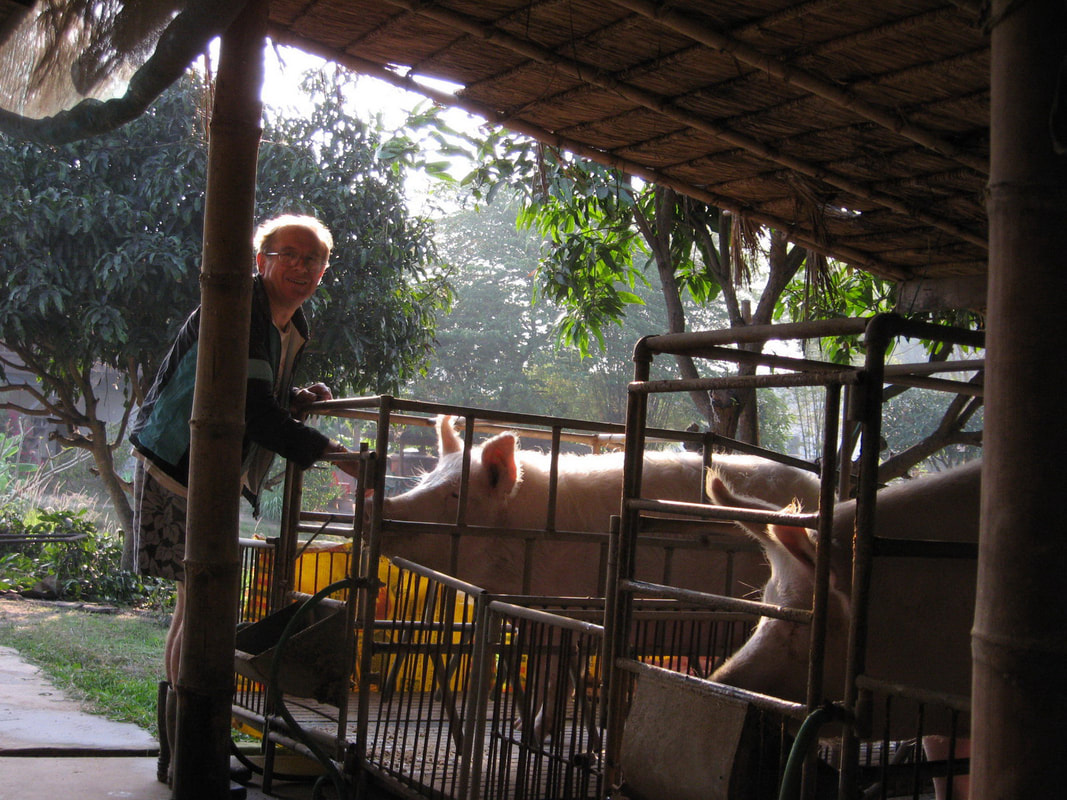
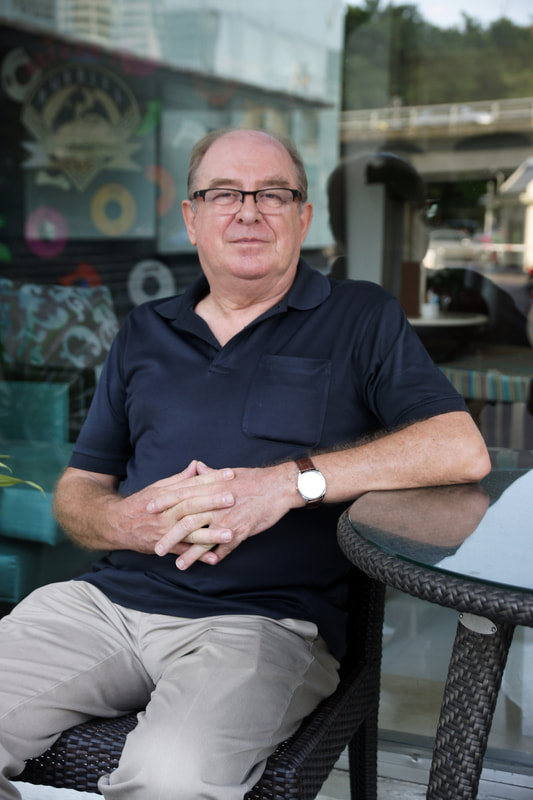
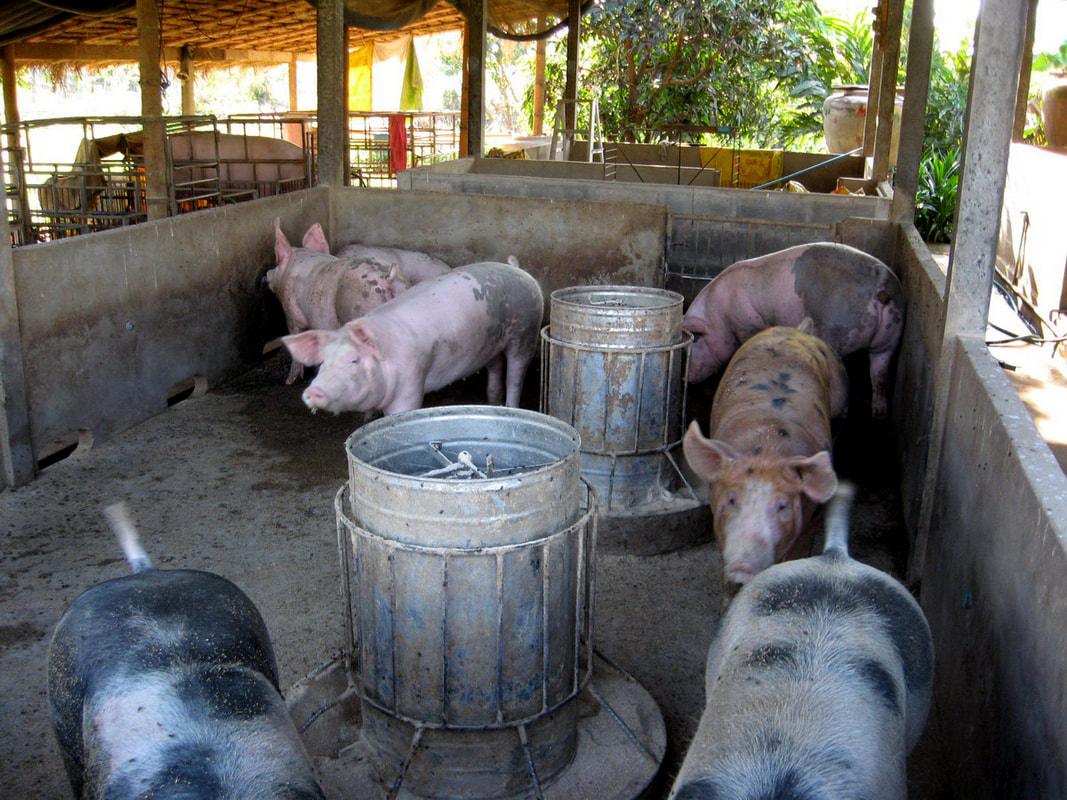
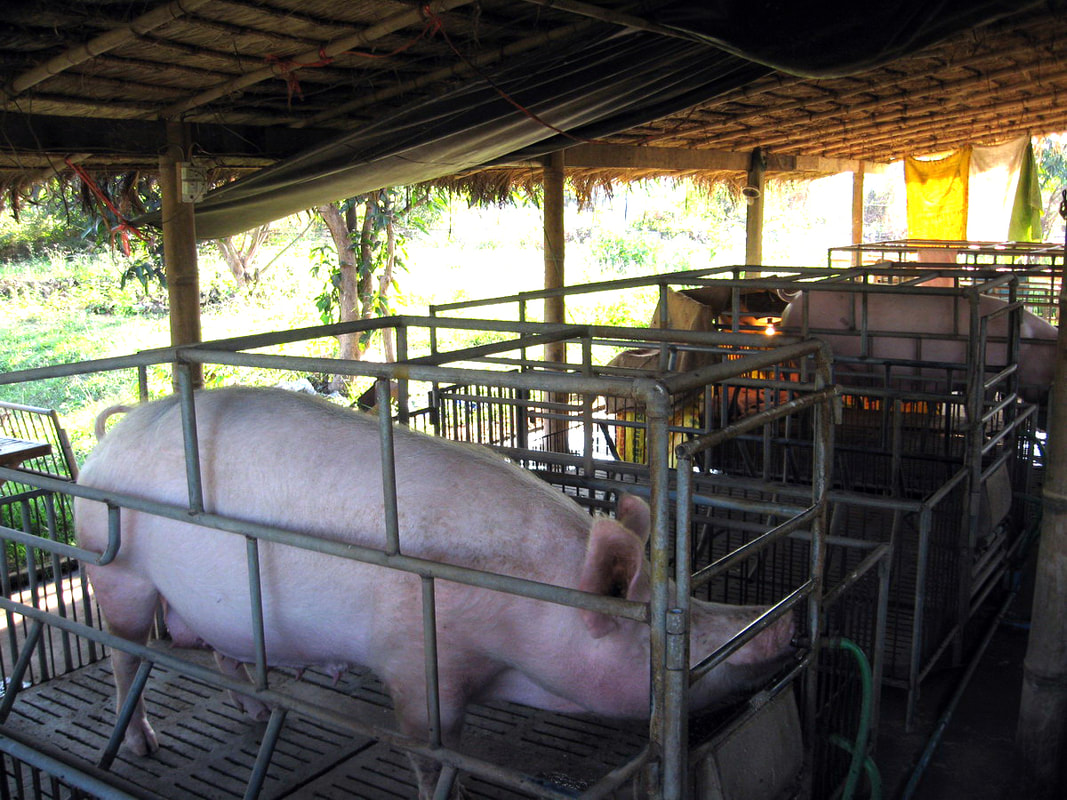
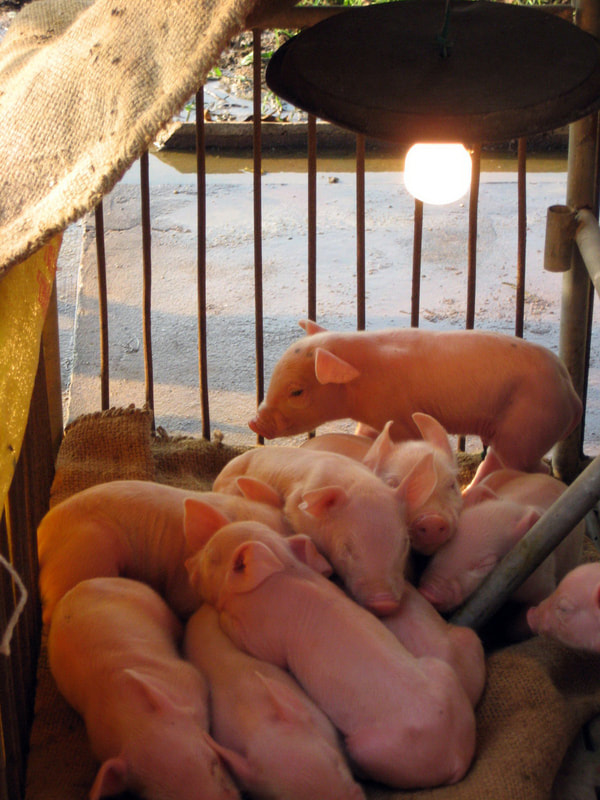
 RSS Feed
RSS Feed
















